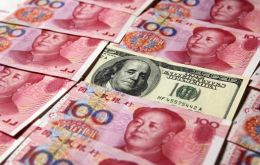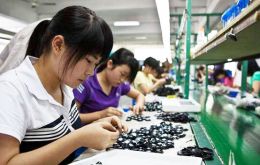MercoPress. South Atlantic News Agency
Tag: China
-
Thursday, August 20th 2015 - 06:54 UTC
Volatile Shanghai Composite down again on Thursday despite Beijing's efforts

After days of volatility Chinese equities traded lower once again on Thursday, despite Beijing's efforts to calm markets. The mainland's benchmark Shanghai Composite was 1.3% down to 3,751.48 points.
-
Wednesday, August 19th 2015 - 06:22 UTC
China stocks continue sell-off on Wednesday after plunging 6% on Tuesday

China stocks continued their sell-off on Wednesday following a 6% plunge in the previous session. The benchmark Shanghai Composite opened down 2.7% at 3,646.75 points on Wednesday before sliding further to register a 5% loss by mid-morning. The index closed down 6.1% at 3,749.12 points on Tuesday, its biggest daily decline since July 27.
-
Tuesday, August 18th 2015 - 10:25 UTC
Chemical blast in Tianjin halts work at auto and farm equipment plants

Toyota and John Deere have said they will halt work at plants near China's port of Tianjin where huge explosions last week killed more than 100 people. Toyota's production lines will be closed until the end of Wednesday while John Deere suspended work indefinitely.
-
Friday, August 14th 2015 - 09:58 UTC
China and Asian markets begin to react to new Yuan daily rate-fix policy

Chinese shares rose on Friday as the central bank set the reference rate for the Yuan slightly stronger. The bank set the rate at 6.3975 per dollar compared to Thursday's close of 6.3982.
-
Thursday, August 13th 2015 - 06:17 UTC
For third consecutive day China weakens the Yuan against the US dollar

The People's Bank of China (PBoC) weakened the Yuan against the dollar for a third consecutive day on Thursday, following reports the central bank intervened to stem the currency's sharp slide late on Wednesday. The PBoC set the Yuan fixing at 6.4010, compared to the previous day's close of 6.3870, sending the currency 0.7% lower to 6.43 per dollar in early trade.
-
Wednesday, August 12th 2015 - 15:18 UTC
China's devaluation triggers fears of a new round of currency wars

China's shock 2% devaluation of the Yuan pushed the dollar higher and raised the prospect of a new round of currency wars, just as Greece reached a new deal to contain its debt crisis. Stocks fell in Asia and Europe as investors worried about the implications of a move designed to support China's slowing economy and exports.
-
Tuesday, August 11th 2015 - 08:18 UTC
China devalues the currency in support of its struggling export sector

China has moved aggressively to devalue its currency in a bid to support its struggling export sector as the economy shows further signs of weakness on the way to reporting its slowest annual pace of growth in 25 years. The People's Bank of China surprised the market on Tuesday weakening the fix on its daily reference rate for the Yuan by a record 1.9%.
-
Thursday, August 6th 2015 - 08:11 UTC
NIESR 2015 global economic growth forecast lowered from 3.2% to 3%

Global economic growth will slow this year to the lowest rate since the financial crisis, according to the National Institute of Economic and Social Research (NIESR). The think tank cut its 2015 forecast to 3.0% from the 3.2% it predicted in May.
-
Tuesday, August 4th 2015 - 05:18 UTC
Oil glut and China's poor manufacturing data reflected in global markets

United States stocks fell on Monday as oil prices touched a six-month low and factory data from China raised concerns about the world's second-biggest economy. Energy stocks were the biggest losers among the main S&P sectors, recording their worst three-day decline in seven months. Exxon Mobil and Chevron, which also reported poor results on Friday, led the losses.
-
Monday, August 3rd 2015 - 13:44 UTC
China's factory activity shrinks the most in two years

Factory activity in the world's second largest economy, China, shrank the most in two years in July as new orders fell more than expected. The private Caixin/Markit manufacturing purchasing managers' index (PMI) dropped to 47.8 in July from 49.4 in the previous month.
